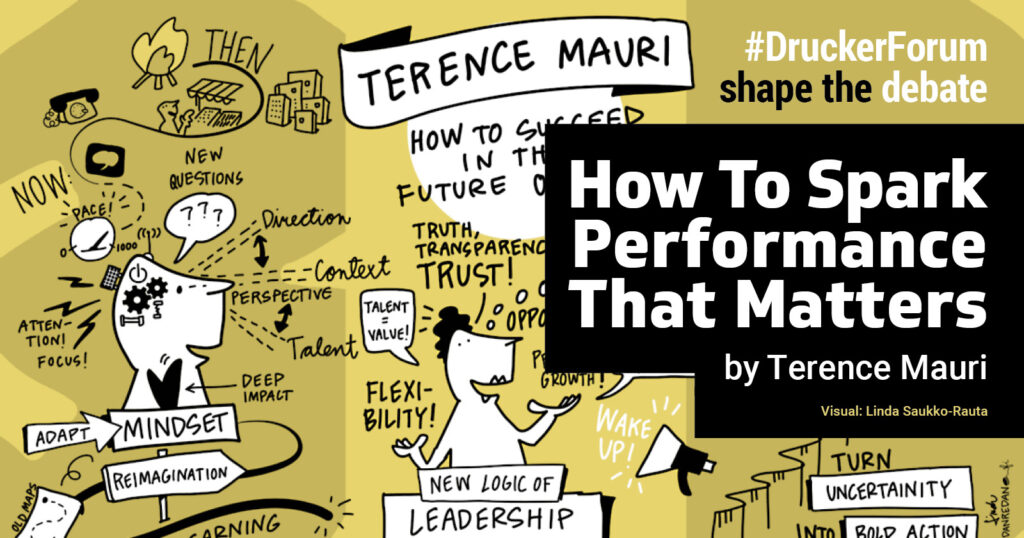
When leaders consider the one thing they could do differently today to help their organization be future prepared, where do they start? With economic headwinds and tech disruption an everyday reality, the best solution is to embed what Peter Drucker called a “spirit of performance” that empowers workers to solve the biggest problems in the organization, calling out blind spots that leaders can’t see and making trust leaps into the future. One of the clearest signs of performance-focused leadership is reframing and rethinking assumptions about what stays, what changes and what goes. This matters because the complexity of issues is outstripping our human capacity to respond, leading to a high “leadership tax” (too much leadership time spent on shallow impact versus deep impact matters).
Performance-focused leadership is defined as a way of leading and managing that inspires workers to challenge the status quo and unlearn the always-done ways that have expired like yoghurt in the fridge. Too often, we value knowing above learning and prioritise doing over thinking. Leaders who care about cultivating a spirit of performance go big on better sense-making and choice-making and ask human-centric questions.
Do we:
- practise performance-focused leadership?
- minimise or maximise freedom and responsibility?
- commodify or humanise the work experience?
- obsess over values, not just metrics?
- make the invisible visceral?
- enable wise choices, not just the fastest?
- bind trust to freedom and responsibility?
- nurture mindfulness?
- nurture existing human brilliance?
Performance-focused companies such as Tata, Moderna, Hermès, Ocado and Estée Lauder are championing the “spirit of performance” by sharpening their performance agendas for culture, people and talent and building meaningful new ways of working despite their complex legacy businesses.
Performance-focused leadership
- Lead from the future, e.g. start writing your future success headlines, today
- Reskill and upskill workers with future-fit skills, e.g. bold thinkers and courageous doers
- Strengthen agility to maintain business continuity and resilience
- Engage workers by aligning opportunities to their individual sense of purpose
- Democratise career development and increase talent to value ratio
- Go big on truth, trust and transparency, e.g. trust is the ultimate human currency for unlocking a spirit of performance
- Provide dynamic reward and recognition incentives for high-performing mindsets and behaviours that model ‘a spirit of performance’.
To spark sustainable performance that matters, leaders should reject “present forward” ways of thinking that simply extend existing assumptions, mental maps and performance frameworks to the future. A failure to reimagine performance is a failure of leadership. Instead, leaders should avoid empty slogans and emphasize binding together the Five R’s: reskilling, recruiting, rewards and recognition, retention, and reinvention.
In Performance, We Grow
As global growth stalls and organizations struggle to retain top talent, performance that matters is a source of resilience and future growth. Leaders who want to outpace the forces of disruption and strengthen human brilliance should reflect on whether their existing cultures, structures and work models are built for performance-focused leadership or conformity-focused leadership. Conformity-focused leadership is a way of leading that deters workers from challenging the status quo. It’s silence over speaking up, fear over freedom and “fake” empowerment whereby workers have the job title but not the power or autonomy to make decisions that matter. It demands deference and downgrades human potential. Hack Future Lab, a London-based think tank, took the pulse of 1,000 leaders globally. An overwhelming 84% agreed that performance-focused leadership is critical for business success and 68% agreed that it is the best way to boost contribution, engagement and retention. The bad news was that more than half the group reported that conformity-focused leadership was the norm and was not even on the C-suite’s agenda as a challenge to be tackled. The bottom line is that performance is seen as incredibly important, but is mismanaged and undervalued in most organizations.
You can’t explore a new world with an old map
Drucker said: “The only real difference between one organization and another is the performance of its people”. What’s clear is that people desire to thrive in human-led, psychologically safe cultures that elevate what makes them more human: believing (meaning), belonging (connection) and becoming (learn and grow). Data at the Mayo Clinic suggests that if less than 20% of your work consists of things you love to do, you are nearly seven times more likely to suffer from burnout (cognitive and emotional burnout) or “boreout”, i.e cognitive underload.
Every company starts as an act of imagination, but to sustain vitality for the long-term requires reimagination, the human force that can push through inertia to create a better future. The disruptive trends that threaten to upend and reshape every vertical over the next five years — disintermediation of supply chains, erosion of traditional economies of scale advantages, and more companies dying younger — will only accelerate. The question is – as leaders how do we capitalize on the disruptive forces of the last few years, and become performance-focused leaders that balance empathy with economics and human maximization with profit maximization?
About the author:
Terence Mauri is founder of Hack Future Lab, an Entrepreneur Mentor at MIT, and Adjunct Professor at IE Business School and a specialist in leadership and change. His latest book, The 3D Leader: Take your leadership to the next dimension is out now.

